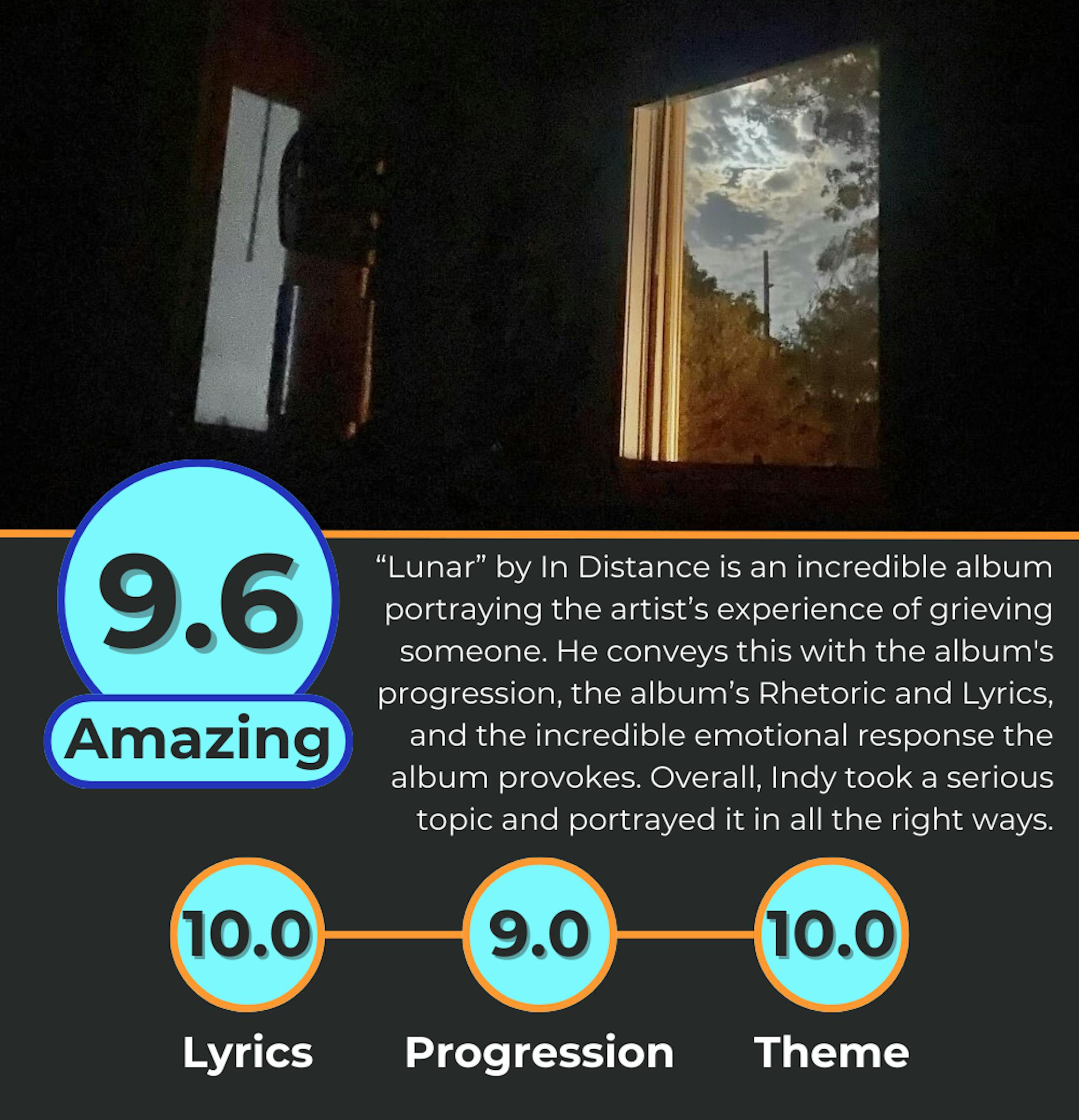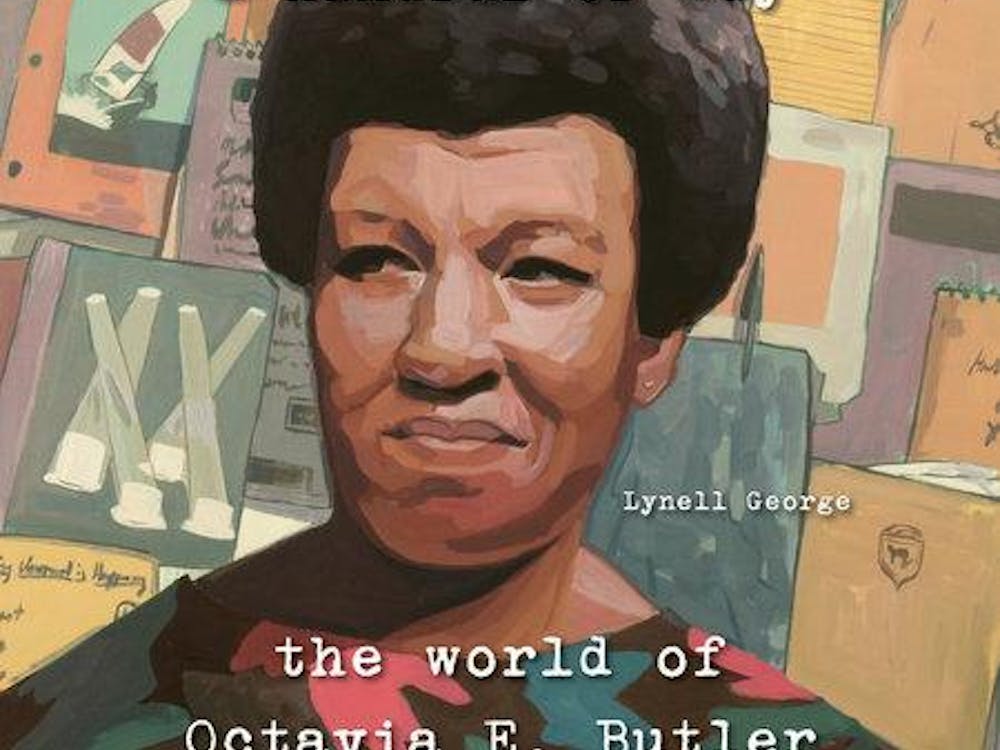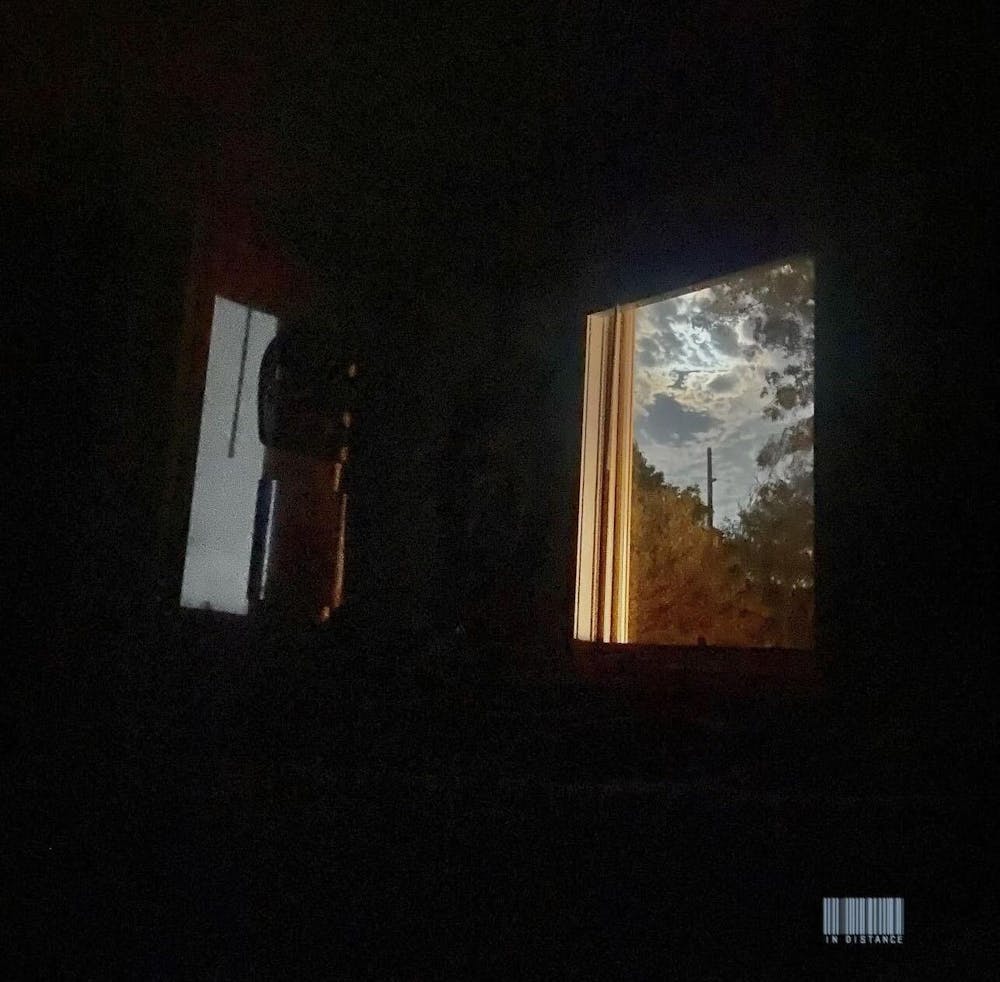The opinions and views expressed in this article are those of the author and do not reflect the opinion of Byte or Byte’s editorial board.
TW: mentions of suicide
In Distance, an emerging 17-year-old artist from right here in Indiana, released his debut album, Lunar, on Oct. 25. Having been a fan of singles like “4th,” “Wide Awake,” and “September”, I knew I had to stay up to listen to the album's release. I’m so glad I did because this album was an incredibly emotional experience. I loved it on the first listen and have loved it every listen since.
Through the album, In Distance (or Indy) “talks” with three characters: himself, someone who was once in his life but is no longer, and the listener. It’s unclear whether this person is a family member, friend, or ex-lover, but Indy can no longer talk to this person and is therefore grieving. In an Instagram post from the night the album dropped, he implies the album is about suicide, saying, “i’m not someone who likes to give away the meaning to things but i’m pretty sure the main message is obvious … suicide is not the answer.”
Grief in Progression
The opening song “After Hours” starts with the sound of a door opening and Indy walking in, sitting down at the mic, and taking a deep breath before the lyrics and instrumentals begin. This is the first of many examples of him using non-traditional means, such as ambient noise, to convey the tone of the album. Here, it serves to set the intimate and emotional tone he plays with throughout the album. The deep sigh he takes before beginning to sing is the first signal of his grief, something heavily portrayed in the album. Grief feels like a million sighs—bittersweet, melancholy, sad, and shaky—and this song, as the name suggests, feels like Indy has sat down with the listener late at night to talk about both his and the listener’s own emotions. The lyrics read like a letter to someone who was once in his life. This person was perhaps really close to Indy, him being there for them through a time of emotional turmoil. He sings, “I’ll keep my eyes closed, so I don’t see the things you throw. Sometimes it’s better not to know.” Perhaps saying this person’s struggles might’ve been too much for Indy to handle, that he didn’t know what to do to help, so he’d rather not have known about this person’s struggles in the first place. Overall, it’s a wonderful song to set the tone of the album as a whole.
The progression of the album is excellent. On a first listen-through, the highs and lows of the album were set up weirdly, “After Hours” being very mellow in contrast to the next two or three tracks on the album being upbeat. However, it grew on me, and I can see why he might’ve done that. This album is an expression of grief, and grief can affect people in funny ways, including in the second track “Okay?” which is an incredible representation of melancholy, bittersweet reminiscing of the memories Indy might have with this person. He talks about telling stories, having good days and bad, wishing he could know what the person is or was thinking. He talks about Daylight, hating it, dreading it. “Okay?” both in its lyrics literally and in the rhetoric surrounding it asks the question “How do I feel okay when you’re so far away?”
I really enjoy the use of interludes—it adds so much to the tone and progression of an album—which is why on an initial glance at the tracklist, I was happy to see one. After the upbeat melody of “Drawing,” “close to 3 (interlude)” was needed to shift the tone and prepare the listener for a rollercoaster of a song (and my second favorite In Distance song of all time), “Wide Awake.”
Grief in Lyrics and Rhetoric
I was pleased to see “September” in this album, especially because of how well it fits both where it is placed in the progression and theme. “September” takes a small shift from the grief Indy is experiencing, and instead shows how it seems to be impacting his life. I personally really related to the lyrics “I’m giving up, not giving in. I don’t like it but that’s how it is.” “September” feels like reading Indy’s diary. The song that follows, “Drawing” feels the same in the first 45 seconds, but turns back to the person Indy who is grieving through the album. He talks about wanting to read what would be on the page the person left “blank.” The metaphor about mirrors later in the lyrics not only portrays the experience of having low self-esteem and depression so incredibly well, but it also portrays the experience of someone close to that person. Having been in both positions at the same time, this lyric really stuck with me.
People, myself included, experiencing these issues often have blinders on to their strengths. It can be so hard to watch someone ignore their incredible attributes, and all I want is for that person to see themselves the way I see them. A lot of songs reference this idea, but I like this one, and the album in general doesn't explicitly say this. The sentiment is still there, but he conveys it in a much more subtle way, through the instrumentals. “Drawing” has a very upbeat and catchy tune referencing how Indy sees this person. The lyrics however contrast that. He does this later in the album with “Astronaut” and does the inverse in “The World is Yours.”
This song talks to all three characters of the album. This is especially shown in the lyric “I wasn’t there when you needed me so I guess I’ll shut up.” First, to himself, he’s conveying that he feels he doesn't have the right to support himself now because he doesn't think he handled things well in the past and still holds some blame for what happened to the second character, the person he is grieving. He speaks to that person in this lyric, not only to take the blame for what happened, but to say he has no right to speak to or about this person now. My reason for believing he is speaking to us, the listeners, is a little more complicated. Last year, in deleted posts and public presentations I attended, he teased that he was going to release this album in December of 2023. He obviously didn’t release it until now, so I think this lyric is him saying sorry, and beating himself up a little bit over not finishing it when he wanted to. Indy is still in high school, and it's incredible to me he has the talent and skill required to make music this good at 17. I’m grateful for any morsel of content he can put out, no matter the timing.
The way the tracks are mixed, as done by Louie Pearl—Indy’s brother—is very well done, and “The World is Yours” is a great example of this. In “Wide Awake,” the lyrics and instrumentals were at times equal in volume it seemed; however, in the beginning of “The World is Yours” it has a heavy emphasis on its lyrics. They are louder than the instrumentals. As the song goes on, the lyrics slowly get drowned out by the instrumentals, especially the keyboard and guitar peaking at the last chorus. The sweet sentiment being expressed in the lyrics gets drowned out by this heavy, distorted guitar. It reminds me again of the experience of being close to someone who struggles with depression and low self-esteem. Sometimes it feels like no matter how many times you repeat the kind words you say to them, no matter how many times you sing the same chorus, their brain will distort it and it feels like it doesn't get through to them. It also helps to add to the theme of grief through the album, the distortion taking on the form that it’s no longer possible to help or reassure this person. It’s too late.
Grief in Emotional Response
A lot of the lyrics in the album also suggest these themes of grief and mourning, and Indy almost blames himself. Simultaneously, he understands that whatever happened wasn’t entirely his fault. It reminds me a lot of my own experiences with grief. I had a friend pass away from suicide in the past, and it reminded me a lot of her and of my experience. After she died, I found myself replaying every conversation, rereading our messages, and over-analyzing every canceled plan to hang out and anything that could’ve given me a clue. Indy is doing the same thing with these lyrics.
This extreme emotional reaction I had is one of the reasons I fell in love with this album at first listen. It not only feels like Indy is sitting down to tell the listener about his experience grieving the loss of this person from his life and his thoughts surrounding it, but it feels as though he is inviting the listener to relate in their own way. It feels like a conversation with a close friend about your experiences. It echoes what I’ve said about Indy since I discovered his music at a presentation of his that I attended, it’s always felt like he’s giving me a hug with his songs.
All of this brings the album to my favorite In Distance song to date, “Astronaut.” I could seriously write a whole article about this song alone, however it has at such a good place in the album. Playing third to last, most people would expect the album to be wrapping up, but Indy packs so much more into these last three songs. He is still questioning a lot about the person he is grieving in “Astronaut.” Suggesting this person died young, and that Indy doesn't know where to find his closure.
In contrast, it’s the first time we hear ideas of acceptance and understanding from the lyrics, despite still grieving. The first bridge and chorus express this. Indy takes much-needed confidence in this song, confidence that he will meet who he is grieving again, on the moon someday. He will be able to express the things he’s been saying throughout the album, ask the questions he wants to ask, and get that final closure about everything. During the last 45 seconds of the song, Indy talks to the listener, almost rapping, and this ghostly reverb effect is on his voice. I got goosebumps on first listen. This fast-talking, spectral effect indicates he knows it’s time to wrap it up; however, he still has so much more he wants to say. He says in the lyrics he feels like it shouldn’t be over. Addressing the listener, in contrast to him addressing the person he lost for most of the song, seems to convey a way he makes himself feel better about harboring these feelings, which he doesn't like, asking, “a coward, isn’t that all I am?” When he is finished, the music swells, and the song ends.
The last two songs of the album, “Moon,” and “Real Skin” are a perfect sendoff for the album. “Moon” is all instrumental with a thank you to the listener at the end. It feels like a quiet contemplation of the whole album. It feels like a lyric from the next song “Real Skin,” which says, “I quietly understand, apathetic and silently.” He is coming to terms with his grief a little more as the album wraps up. He takes a hopeful turn in “Real Skin,” with a key change, and the highest key in the whole album. The lyrics address all three characters, saying, “The sun will come out, we’ll be okay; trust me.” This song at the end of the album feels like he’s saying it’s okay to grieve. It’s okay to have all the weird feelings he’s had throughout the whole album. He turns his attention to the person he grieves for the last time, saying, “It wasn’t you that I sought, sitting across: call me up, let me know what’s to come.” The guitar in the song swells, once again drowning out the vocals, but this time in a different connotation. The guitar and its melody can be read very clearly, instead the vocals “That’s all” and other lyrics are distorted and in the background of the song. Indy is both letting go of and holding onto his grief at the same time. The album ends with the sound of a page-turning, signaling both the ending of an old page and the beginning of a new one. Signaling the closure from the blank page referenced in “Drawing.” Signaling this story is not over. It’s a beautiful and truly chilling ending to the album.
Grief in Conclusion
To restate, Lunar by In Distance is an incredible album portraying the artist’s experience of grieving someone. He conveys this with the album's progression, the album’s rhetoric and lyrics, and the incredible emotional response the album provokes. The instrumentals supplement the theme incredibly and shifting the person the artist refers to is an incredible tool. Overall, the emotional response from the album helped me a lot in my personal life and I cannot recommend the listen enough.

Graphic created by Willow Emig with image provided by In Distance's album cover for Lunar.
Sources: Spotify, Spotify, Spotify, Spotify, Spotify, Instagram, Spotify, Spotify, Spotify, Spotify, Spotify, Spotify, Instagram, Spotify, Spotify
Photos: Spotify
Contact Ashton Weir with comments at mooseweir@gmail.com



















